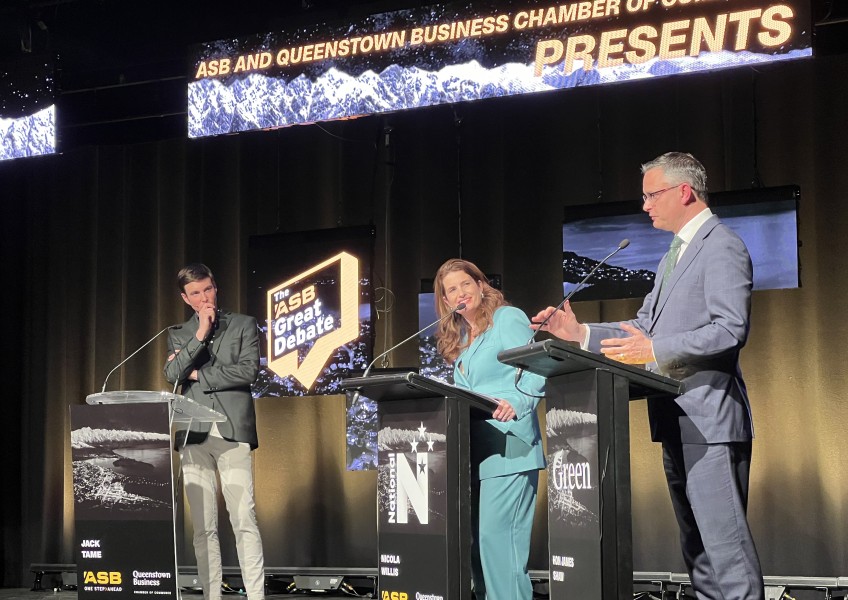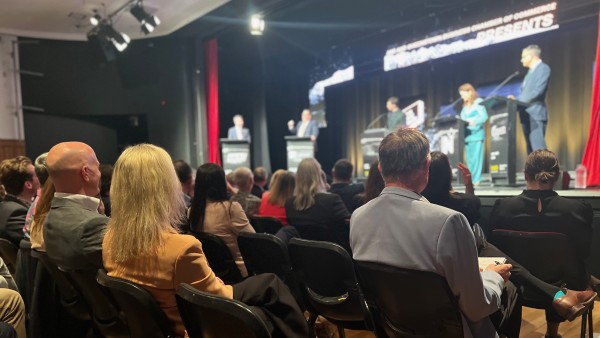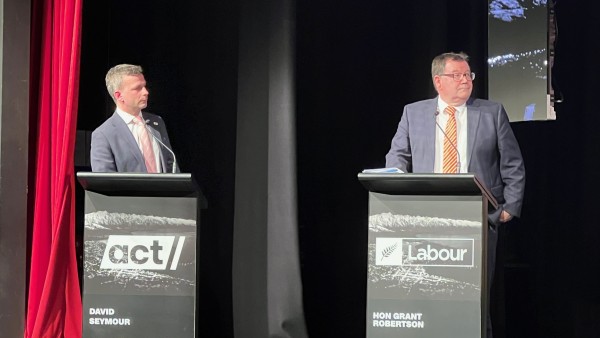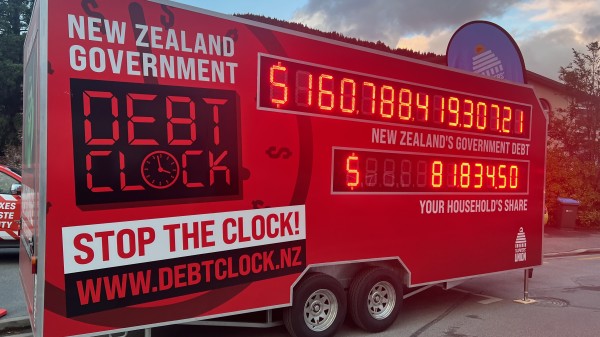Finance spokespeople face off in fun, sometimes fiery, Queenstown debate

The four top runners vying to hold the country's purse strings come October have faced off in what was both a fun and fiery debate in Queenstown tonight.
Taking the stage at the town's memorial centre were ACT's David Seymour, Labour's Grant Robertson, National's Nicola Willis, and the Green Party's James Shaw - a late swap-out for party finance spokesperson Julie Anne Genter.
Debate moderator Jack Tame introduced the debators as the politicians with the potential power to put "our money where their mouths are".
He encouraged the audience to let their opinions be known, saying "this isn't the library, you're welcome to make some noise".
And the sell-out crowd did - rewarding the politicians with strong applause, even cheers, when they liked what they heard, plus a few groans, boos and heckles when they did not.
Queenstown Lakes District Mayor Glyn Lewers set the tone for the back-and-forth on stage, warning the debaters he did not want to hear any "vague" answers from them, especially when it came to the big issues affecting this district.
He didn't hold back with what's atop his wishlist for whoever takes power next month, saying Queenstown Lakes does not have the luxury of a large ratepayer base like bigger cities.
"Our district is the poster child of Aotearoa New Zealand...Without a mechanism to levy visitors we're struggling to keep up with providing infrastructure and services for the growth that continues to trend upwards."
All four politicians were asked straight up whether they would support one; Labour and the Greens said 'yes', although some of the answers, unfortunately for the mayor, were a little vague, adding the caveat of legal challenges ruling one out, as was the case with the Auckland bed tax, while it was a 'kind of' from ACT, who proposed a reserved portion of the GST gathered locally to be directed this way, and a 'no' from National, who instead promised it would sit down and strike a "deal" with Queenstown to deliver the infrastructure needed if it becomes Government.
More important for all the speakers was getting across to the audience their party's plans for improved funding of infrastructure in general, with all agreeing there had been woeful underinvestment for decades.
Both National and ACT spoke about shaking up current funding models, and inviting more private capital into public projects.
"In New Zealand, the only way to pay for it (infrastructure builds) is if the council or the Crown can afford it on its own balance sheet. If they can't afford it, you just waste another generation seeing if it gets built - probably not," Mr Seymour said.
"In short, we have only one way of funding infrastructure in New Zealand; overseas they have many ways, and if we don't start doing that too...we'll just stagnate."

It was a sell-out crowd in Queenstown, with the debate live-streamed across the country.
The first groan of the night hinted at the priorities of those in attendance - it was in response to Mr Shaw's opening comments referencing a climate crisis.
While in comparison, Mr Seymour's opening comments suggesting New Zealand is heading towards being a "middle income country that's nice to visit" but not reaching its potential were met with rousing applause.
Ms Willis' opening comments promised "sensible spending decisions" if voters put her in charge of the country's books, sparking a fiesty exchange with Mr Robertson, who accused those on stage alongside him of being "professors of hindsight economics" as they bashed his management of the pandemic.
"Governments respond to the problems that are in front of them and we've come through the Covid crisis as well as any other country.
"We did invest to save people's lives and to save people's businesses and, yes, it costs money, just as the infrastructure that Glyn wants to build here all costs.
"We do it in a balanced and responsible way and we look after people."
Ms Willis was grilled on the news of the day - three top economists suggesting National's modelling around a new tax on foreign home ownership is flawed.
The party is promising to end the ban on non-residents being able to buy houses in New Zealand - as long as the homes bought are worth more than $2 million a 15 percent tax is paid by the buyer to the government.
It is one of four key tax changes proposed to allow the delivery of tax cuts to Kiwis.
However, independent modelling released today rubbishes National's numbers, claiming the foreign buyer tax would only raise $290 million a year with a shortfall of $450 million, or 61 percent.
Ms Willis played it down, saying the thing with economists is, you get them all in a room and they all have something different to say. She said she rejected some of the "assumptions" made by today's trio.
"I've spoken to real estate agents who are in this room who have told me that there is huge demand from people who want to buy expensive, luxury homes in New Zealand, and they're going to come back and I'm going to tax them and I'm going to use that to ensure New Zealanders, the squeezed middle, working people, get to keep more of what they earn."
Throughout the debate, Mr Robertson was relentless with his calls for National to show their numbers.
Plenty of the audience, as well as those alongside Ms Willis on stage, were sceptical of her assurances the proposed tax wouldn't drive up property prices in the already piping hot Queenstown Lakes market.
Mr Shaw appeared to have a better read of the room later in the debate, after his initial climate change reference flopped, receiving a few chuckles rather than groans for thinking on his feet when criticising National's proposed cuts to climate change work: "Nicola wants to defund the entire government work programme on climate change, which is paid for by polluters, in order to fund her tax cuts, alongside these non-existent houses."

The ACT Party's David Seymour was an audience favourite, rewarded for his quick quips.
Mr Seymour appeared to be an audience favourite, as he has been in other years, coming across as relaxed, and quick with the quips and, occasionally, the barbs.
He had strong support for his promises to cull staffing numbers in certain government departments, citing the Ministry of Business, Innovation and Employment has having nearly doubled in size over the past six years.
"How often do you talk to business people who say, 'You know, I'm so glad it has nearly doubled in size because it's so much easier to do business now'."
Mr Roberston pointed out it was that very department that had helped facilitate events like the Winter Games and the NZ Golf Open in the district.
"I've enjoyed coming down to Queenstown over the last few years...This community will not have those events, they won't happen" if the ministry is defunded in the way Mr Seymour suggests.
Queenstowners took offence, with one member of the audience piping up to tell the deputy prime minister, "I promise you the Winter Games will stay".
The four were asked for their ideas on the path to a high-skilled, high-wage, high-tech economy, and once again Mr Seymour proved he knew his audience.
"It's not up to these people (referring to the politicians on stage) - it's not up to any political party. It's up to investors with savings. It's entrepreneurs with ideas. It's workers with time."
He said the country needs an "infusion" of "talent and ideas and money from outside as well as inside New Zealand".
"It's too small to put up walls to foreign direct investment the way that we do. It's too small to put up barriers to people bringing in their skill. It's too small for tall poppy syndrome that means we're opposed to anyone coming here but especially if they're successful. We can't afford to keep holding the world out."
On the subject of bringing people in, the audience rewarded Ms Willis for her party's proposal to ditch median wage requirements for some visa holders.
She said Labour's status quo "means you can have a new immigrant getting paid much more than the New Zealander next to them" in many workplaces, especially in Queenstown.
But Mr Robertson was quick to point out that sort of migration is a step back to a system that "drove wages down".
"I thought we were after a big-wage economy."
When it came to housing, Mr Seymour again scored a win with locals, requesting a stop to "the war on landlords", referencing talking to homeowners in town today perplexed by the government's tougher housing standards for long-term rentals, which do not apply to Airbnbs.
"Grant Robertson, who I admire for having the best of intentions, manages to screw it up again," he said to laughter.
All four politicians committed to reassessing zoning criteria related to the Accommodation Supplement, which locals have lobbied to change after years of no movement, resulting in urban areas of Queenstown being classed as rural, and residents ineligible for additional support.
All made appropriate noises when grilled by Mr Tame on the topic, with Mr Shaw coming out strong and calling the current rules "completely bonkers".

Enviable parking spot for the Taxpayer's Union and its digital debt clock.
Gatecrashing the event (or the entry to it anyway) was the Taxpayers Union, with its New Zealand Debt Clock, parked in an enviably prime spot outside the event centre - a feat in itself considering the state of parking availability in Queenstown's CBD.
Sitting atop a trailer that has been towed around the country since its launch outside Parliament in October, the seven-metre long, electronic sign tracks in real time the money politicians are borrowing on taxpayers’ behalf.
In a statement to media today, spokesperson Jordan Williams said, "Government debt has soared past $160 billion and continues to climb at a rate of $72 million each and every day".
The travelling sign is to remind the public and politicians of "the dire state of the books", he said.
The ASB Great Debate was hosted by the Queenstown Business Chamber of Commerce and has become a fixture on the campaign trail since it was first held in 2014.
Main image: Jack Tame moderates a fun, at times fiery debate between the major parties' finance spokespeople in Queenstown, exactly one month out from Election Day.


























